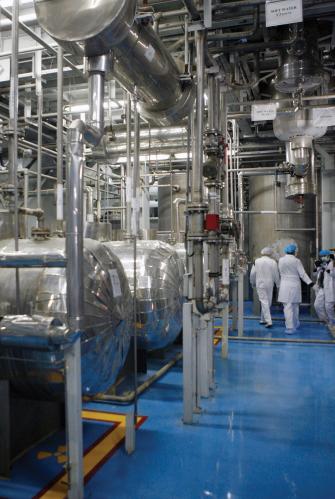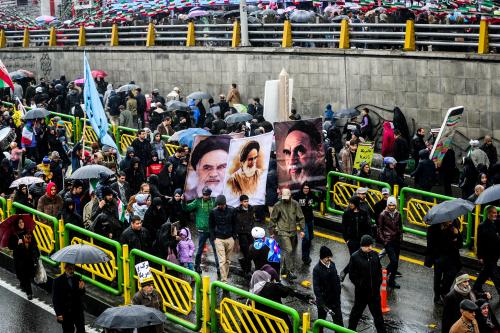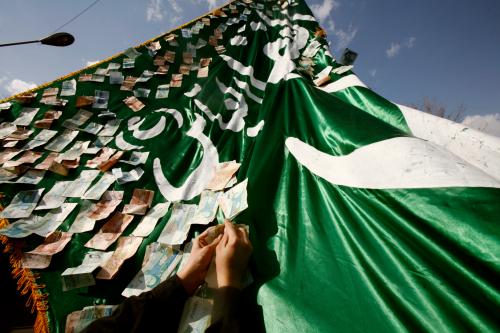Monday’s decision by President Donald Trump to designate Iran’s Islamic Revolutionary Guard Corps (IRGC) as a foreign terrorist organization may be his most emblematic move on the world stage to date. The announcement has generated an entirely predictable paroxysm of histrionic rhetoric from all sides, but it is almost certain to accomplish nothing more substantial than that. Trump’s approach to Iran seems designed to create the appearance of his trademark gust of “fire and fury” while carefully skirting the unpleasant human, financial, and political consequences of instigating a direct military escalation. Scripted antics may be ratings gold in the reality television shows that fueled the president’s rise to national fame, but as the case of Iran is already demonstrating, Hollywood tricks are a poor substitute for effective American foreign policy.
Trump and his senior advisors described the designation as another step in the relentless American campaign to apply “maximum pressure” on the Iranian government in a bid to end its most objectionable policies, either through its capitulation at the negotiating table or its decapitation by some idealized hope of regime change. But the link between means and ends is precisely where the much-hyped announcement falls short.
Despite more than two years of concerted efforts to turn up the heat on Tehran, there’s little evidence that Iran’s leadership is prepared to undertake dramatic revisions to its regional security posture or its repressive domestic policies. And despite real vulnerability within the ruling system today, the prospects for a near-term transition to a more responsible government remain as nearly as distant as they have ever been. Critics of this latest move have been vocal but misdirected; instead of spinning hyperbolic hypotheticals about the designation, they should focus on the extent to which the Trump approach to Iran has failed to make meaningful progress in curbing any of Iran’s malign behavior.
All bark and no bite?
As a public relations tool, the designation adds heft to the administration’s repeated contention that Iran is not a “normal state.” Trump officials have sought instead to emphasize their view of Iran as a rogue or outlaw state. This marks the first time that Washington has ever branded a state military institution as a foreign terrorist group, and in that sense the designation underscores the overall messaging of the current administration’s approach to Iran.
In a coordinated series of remarks, senior U.S. officials sought to hype the designation with vague bombast. Both President Trump and Secretary of State Mike Pompeo declared that the designation sent a “clear message” to Tehran. In a State Department press briefing, Trump’s ambassador-at-large for counterterrorism, Nathan Sales, along with Special Representative for Iran Brian Hook, who heads the administration’s new Iran Action Group, boasted that Washington is “stigmatizing” the Revolutionary Guard and insisted that the new designation will “render the IRGC radioactive.”
Trump administration officials and their boosters make a powerful case about the IRGC’s track record of sowing violence across the Middle East and abusing the Iranian people. However, they seem hard-pressed to offer a detailed justification for why they believe this designation—on top of the multiple layers of preexisting penalties and restrictions already applied to the IRGC and its fellow travelers—“changes everything,” as Hudson Institute senior fellow Michael Pregent tweeted.
To be sure, Trump’s latest move will undoubtedly aggravate the uncertainty that has already battered the Iranian economy, thanks to an onslaught of U.S. sanctions that have slashed its oil exports and foreign currency reserves, sent foreign firms running for the exits, and intensified the day-to-day hardships for Iranian citizens. Beyond the branding exercise and modest fallout on the economy, however, there is little reason to believe that it will prove a game-changer.
As numerous media explainers have already made clear, Washington’s designation of the IRGC as a terrorist group will have little practical impact on Iran’s military capabilities or its economic opportunities. This is a function of the redundancy of the existing American sanctions regime, which targets Iran’s security leaders and institutions through a virtual fusillade of financial and trade restrictions on grounds that include support for terror, proliferation, and human rights concerns, along with a host of other issues. The Revolutionary Guards and its leaders, affiliates, and subsidiaries all feature prominently and repeatedly among the specific recipients of these standing restrictions, including prior designations of the IRGC, its Quds Force, and Iran’s intelligence ministry as “specially designated global terrorist entities” under Executive Order 13224.
This latest step of designating the IRGC as a foreign terrorist organization augments the existing pressure with a few new levers, including the introduction of the threat of criminal prosecution; any individual or entity “knowingly” providing material support to the IRGC will now face the possibility of a 20-year U.S. prison sentence. It’s hard to imagine that this will prove a more meaningful deterrent than the steep U.S. financial and criminal penalties that already apply to doing business with the Guards. And it’s even less credible that the organization’s primary terrorist proxies or its partners—which span U.S. allies, such as Iraq, as well as adversaries like Bashar Assad—will seek to dissociate their governments from the Guards’ security and financial assistance. The new designation also restricts immigration by IRGC members, a measure that is already superseded by the Trump administration’s unprecedented, unjustified, and unconscionable 2017 prohibition on U.S. entry by all Iranians.
Critics in hyperdrive
While the practical utility of designating the IRGC as a terrorist organization may be modest, reactions to the move were decidedly not. Unsurprisingly, Iranian officials responded with a torrent of indignation, a tit-for-tat terrorist designation of U.S. Central Command by Iran’s national security council, and threats of retaliation. This came alongside an orchestrated backlash with members of parliament donning Guards’ uniforms in solidarity and headlines in reformist newspapers proclaiming unity among the often-fractious political establishment.
Outside Iran, a number of analysts and observers expressed alarm about the designation’s implications for Iran’s domestic politics and its regional posture, anticipating that the designation will erode Tehran’s adherence to the nuclear deal and the prospects for future U.S.-Iranian diplomacy. Many contended the move was intended to provoke a military clash between American and Iranian forces. Former Obama administration official Ben Rhodes opined that designating the IRGC as a terrorist organization “only makes sense as a step toward conflict,” while the International Crisis Group’s Ali Vaez described it as a move that “managed to kill Trump’s dream of reaching a broader deal [with] Iran, rendered reentry into the JCPOA politically costlier for the next president, and provoke the IRGC into providing him with a [casus] belli. And Trita Parsi, founder of an Iranian-American advocacy organization, tweeted that “war will essentially become inevitable.”
Unfortunately, Trump’s critics are taking the wrong approach. First of all, their apocalyptic predictions are overstated and not credible. In fact, similar sniping accompanied nearly every previous intensification of economic or diplomatic pressure on Iran, including those undertaken by President Obama in the prelude to the negotiations that produced the nuclear deal. For at least a decade, experts and practitioners who support engagement with Iran have routinely warned that every new economic, military, or diplomatic measure applied to dissuade Iran’s most destabilizing policies is wrong-headed. They argue that any new pressure will poison the well, harden the regime’s resolve, strengthen its hardliners, impede diplomacy and/or coordination in the anti-ISIS campaign, endanger American troops in the region, and may inadvertently precipitate a direct military conflict.
Many of these concerns have proven repeatedly overstated or even misplaced. Economic pressure played a major role in prompting a monumental shift in Iran’s willingness to negotiate over its nuclear program in 2013; at least a dozen years of urgent forewarnings about the inevitability of military conflict remain as yet premature, as the presumed slippery slope toward war has proven remarkably sticky instead. There are certainly risks inherent in this unusual designation, but the breathless melodrama articulated in recent days by opponents of the decision almost certainly overstate them.
More to the point, Trump’s critics only validate his bluster on Iran. A more effective critique of the Trump administration’s Iran policy is that it has failed to generate any obvious movement toward either of its presumptive aims: the president’s expressed hope for a bigger, better deal or his advisors’ longstanding insistence that regime collapse is imminent. An Iran that languishes for years under excruciating economic pressure may be a sufficient outcome for some within Washington, but it leaves all Tehran’s most dangerous policies unchecked and corrodes the very assets that make the Islamic Republic such a critical player for shaping the future of the broader Middle East—its vibrant, well-educated population, its diverse economic base, its immense historical legacy of regional leadership.
Meanwhile, the passage of time brings the world inexorably closer to the expiration of the various restrictions on Iran’s nuclear activity embedded in the 2015 deal. Once those limitations have sunset, Tehran will be unfettered from limitations or international scrutiny, free to pursue an industrial-scale, advanced nuclear program that has been effectively legitimized by the international community. Having spurned its allies and the other crucial partners to the nuclear deal, Washington will not be in a position to lead a diplomatic effort to forestall that outcome, leaving only the most dangerous and least effective option of unilateral force.
Designating the IRGC as a terrorist organization serves no constructive purpose. But neither does the hysterical opposition to this move by Trump’s critics. Both sides of the dysfunctional Iran policy debate risk missing the forest for the trees in the litigation of specific sanctions decisions. Instead, responsible policymakers from both parties and from America’s allies in Europe and the region must come together to chart diplomatic course out of the strategic stalemate on Iran.
The Brookings Institution is committed to quality, independence, and impact.
We are supported by a diverse array of funders. In line with our values and policies, each Brookings publication represents the sole views of its author(s).








Commentary
What both Trump and his critics get wrong about the IRGC terrorist designation
April 11, 2019